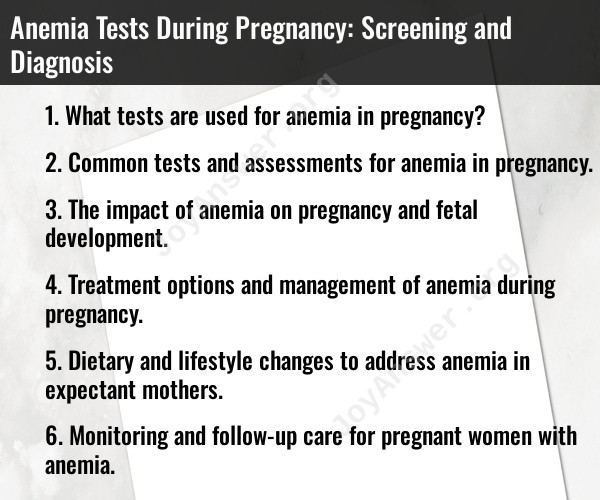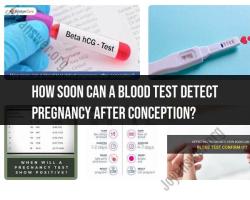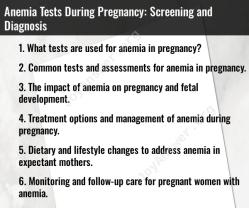What tests are used for anemia in pregnancy?
During pregnancy, anemia is a common concern, as pregnant women are at an increased risk of developing iron-deficiency anemia due to the higher demand for iron to support the growing fetus. Anemia can lead to fatigue, weakness, and other health issues, so it's important to diagnose and manage it during pregnancy. Several tests are used for screening and diagnosing anemia in pregnant women:
Complete Blood Count (CBC): A CBC is a standard blood test that measures various components of the blood, including hemoglobin levels. Hemoglobin carries oxygen in the blood, and a low hemoglobin count is an indicator of anemia. If the hemoglobin level is below the normal range for pregnant women, it may suggest anemia.
Hematocrit: Hematocrit is another blood test that measures the percentage of red blood cells in the total blood volume. Low hematocrit levels are indicative of anemia.
Serum Ferritin: Serum ferritin is a blood test that measures the levels of ferritin, a protein that stores iron in the body. Low serum ferritin levels can indicate iron-deficiency anemia, which is the most common type of anemia in pregnant women.
Total Iron-Binding Capacity (TIBC): TIBC measures the blood's capacity to bind to iron. High TIBC levels can be a sign of iron-deficiency anemia because it indicates that the body is attempting to capture more iron from the bloodstream.
Reticulocyte Count: Reticulocytes are young, immature red blood cells. A reticulocyte count can help determine if the bone marrow is producing an adequate number of red blood cells. Low reticulocyte counts may suggest anemia.
Peripheral Blood Smear: A peripheral blood smear is a microscopic examination of a blood sample to assess the size, shape, and overall appearance of red blood cells. Abnormalities in red blood cell morphology can provide additional information about the type of anemia.
Additional Tests: In some cases, additional tests may be necessary to determine the underlying cause of anemia. For instance, tests for vitamin B12 and folate levels can help diagnose megaloblastic anemia, which is often caused by deficiencies in these vitamins.
It's important for pregnant women to receive routine prenatal care, which typically includes regular blood tests to monitor for anemia and other health conditions. If anemia is diagnosed, healthcare providers will work with the pregnant woman to develop a treatment plan, which may include iron supplementation, dietary changes, or other interventions to address the specific type and cause of anemia. Early diagnosis and appropriate management of anemia during pregnancy are essential to ensure the health of both the mother and the developing fetus.
Common tests and assessments for anemia in pregnancy
Anemia is a common condition during pregnancy, affecting up to one-third of all pregnant women. It is caused by a decrease in the number of red blood cells or the amount of hemoglobin in the blood. Red blood cells carry oxygen from the lungs to the tissues, and hemoglobin is a protein in red blood cells that binds to oxygen.
There are a number of tests and assessments that can be used to diagnose anemia in pregnancy. These include:
- Complete blood count (CBC): A CBC measures the number and type of blood cells in the blood.
- Hemoglobin and hematocrit levels: Hemoglobin is a protein in red blood cells that binds to oxygen. Hematocrit is the percentage of red blood cells in the blood.
- Iron studies: Iron studies measure the amount of iron in the blood and the body's ability to use iron.
If a pregnant woman is found to be anemic, additional tests may be performed to determine the underlying cause of the anemia.
Impact of anemia on pregnancy and fetal development
Anemia during pregnancy can have a number of negative impacts on the mother and the baby. For the mother, anemia can cause fatigue, shortness of breath, and lightheadedness. It can also increase the risk of infection, postpartum hemorrhage, and preterm birth.
For the baby, anemia can lead to low birth weight, increased risk of infection, and developmental delays.
Treatment options and management of anemia during pregnancy
The treatment for anemia during pregnancy depends on the underlying cause of the anemia. If the anemia is caused by iron deficiency, iron supplements will be prescribed. If the anemia is caused by a deficiency of another nutrient, such as folic acid or vitamin B12, supplements of those nutrients will be prescribed.
In some cases, blood transfusions may be necessary.
Dietary and lifestyle changes to address anemia in expectant mothers
There are a number of dietary and lifestyle changes that pregnant women can make to help prevent and treat anemia. These include:
- Eating a healthy diet that is rich in iron and other nutrients.
- Taking prenatal vitamins.
- Avoiding smoking and excessive alcohol consumption.
Monitoring and follow-up care for pregnant women with anemia
Pregnant women with anemia should be monitored closely to ensure that their condition is improving and that their baby is developing properly. They will typically need to have their blood counts checked regularly.
If the anemia is severe or if it does not respond to treatment, the woman may need to be hospitalized for further evaluation and management.
Conclusion
Anemia is a common condition during pregnancy, but it can be serious if not treated. If you are pregnant, it is important to get regular prenatal care so that anemia can be diagnosed and treated early.




